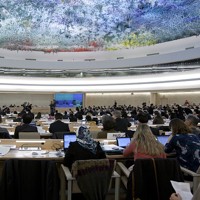For the United Nations Human Rights Council, which began its final regular session of the year on Sept. 10 in Geneva, Switzerland, 2012 has been an important year. The closing session, the council’s 21st, provides a unique opportunity for the HRC to build on its recent successes and repair much of the credibility lost in the first few years of its existence. However, the potential still exists for “spoiler” states, such as Russia, China and Cuba, to stall or reverse progress. The best possibility for success is for the United States, Europe and the rising democracies to continue to guide the council in the direction of promoting and protecting human rights.
Since taking over from its predecessor, the U.N. Commission on Human Rights, in 2006, the council has experienced growing pains caused by an opening up of membership from primarily Western states to developing states as well. It has also developed a credibility deficit by focusing selectively on Israeli abuses (.pdf) to the exclusion of serious issues in other states and decreasing the powers of many of its predecessor’s mechanisms. For instance, the Advisory Committee, formerly the Sub-Commission, lost its power to independently undertake studies of key human rights issues, removing what used to serve as an important hub for activity. In 2009, the council reached a new low when it passed a resolution “commending” the Sri Lankan government’s human rights efforts, in spite of rampant abuses committed during that country’s civil war. As Human Rights Watch put it last year, for much of its existence, the council has acted “deplorably.”
And yet, despite its credibility issues, the past two years have seen significant and accelerating improvements that have allowed the council to mostly succeed in fulfilling its mandate. The best example is the council’s activism during the early stages of Libya’s civil war: Its demand that Libya’s membership in the council be revoked arguably shifted the narrative in New York, pushing the Security Council into action.

